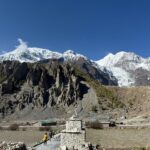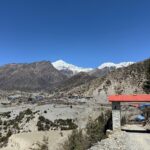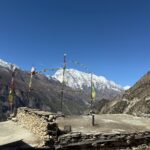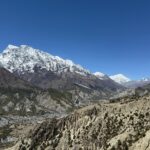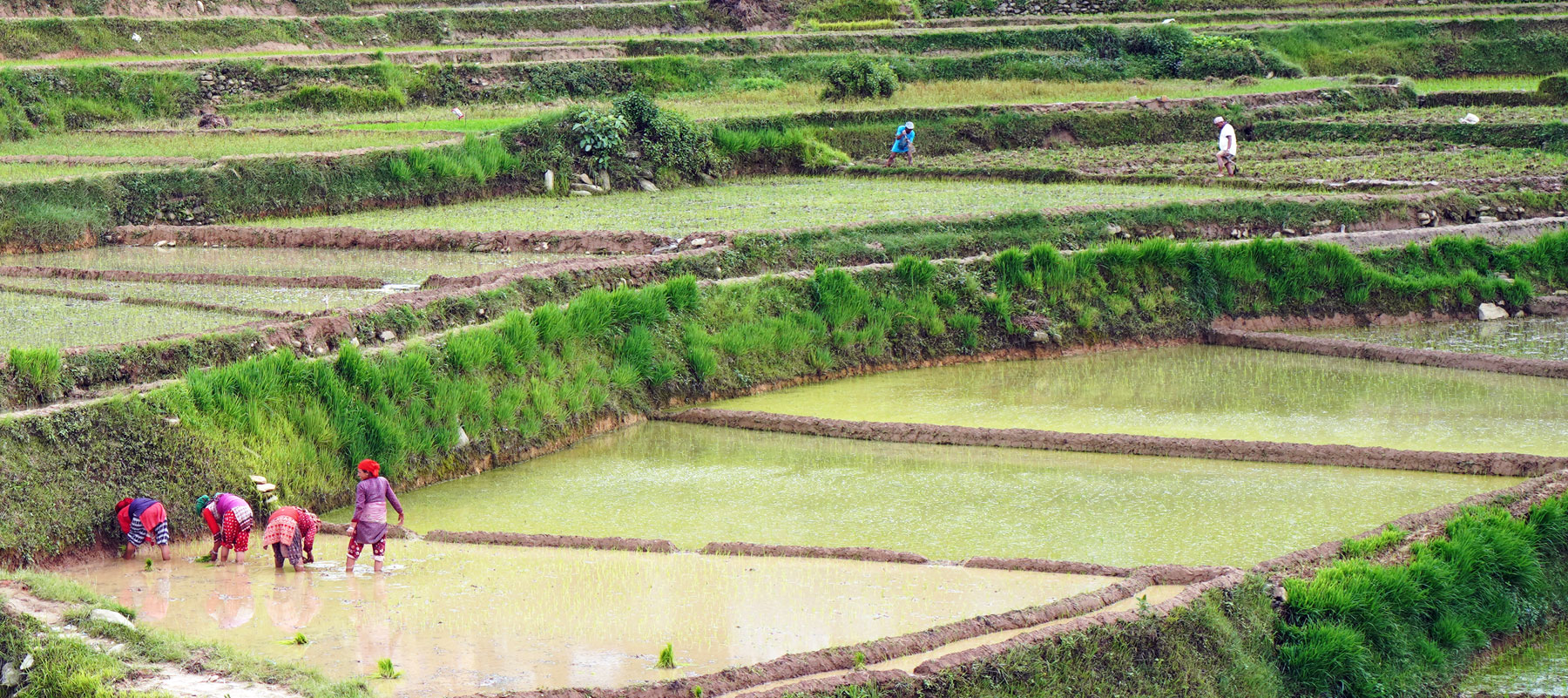
Agrotourism in Nepal
As a kind of rural tourism, agrotourism in Nepal is really an effective ways to enjoy Nepal’s traditional agricultural life. Geographically located in the Himalayan region, Nepal has a varying in climate conditions and terrain, which makes it possible to practice different types of farming systems with/mixed with varying degrees of success; the more widely recognized one being the paddy field farming prevalent in the slopes of hill landscapes, and tea gardens found in the eastern part of Nepal. It is possible to join the daily practices of the local farmers and actually work into plantations, including planting, while reaping and tending to the livestock.
Normal hotels are replaced with traditional homestays – it helps to be close to the locals and to feel hospitality of Nepal. The wonderful local farm food is an option and you get to learn more about different traditional practices in agriculture from different generations. : Agrotourism is very revealing and educational where initiatives concerning the making of unique regional products including extra- organic honey, coffee, and spices are concerned.
Nepal’s agrotourism supports development and sustainably tourism for economic benefits for rural dwellers hence fostering balanced agriculture practices. Agrotourism helps these communities and enhances your concern for those rich cultural and agricultural people of Nepal. This way of travelling not only makes your trips much more interesting, but also yields to the rural development of Nepal.
What is Agrotourism?
An agrotourism is essentially a tourism where guests get the opportunity to be engaged in daily life of farm or rural community. This includes participating in farm activities, learning about farming best practices and consuming farm-to-table meals. Guests can plant seeds, harvest produce, groom animals, and learn about beekeeping, coffee processing and wine-making. Agrotourism is very important in encouraging sustainability in tourism and development of rural areas. Not only does it support local labor, but also the consolidation in traditional farming methods. For tourists, this offers the chance to experience the realities of life as a farmer bringing an understanding, and hopefully a respect and appreciation for the time-honored dedication in support of rural communities.
Is Nepal a right destination for agrotourism experiences?
Agrotourism Trips in Nepal Yes, Nepal which is a great option for Agrotourism trips. With its intriguing agricultural past and gut-wrenchingly delightful landscapes, this country is a dream destination for travelers looking to get a little taste of yeehaw-life up close and personal. Diverse climatic conditions and topographies in Nepal facilitate a variety of farming including the iconic hill terrace rice paddies to the flourishing tea gardens in eastern parts of mountains.
By doing so, you will be able to work in a variety of agricultural works such as planting, harvesting and taking care of farm animals. You learn hands-on work that will give you the knowledge base for how a sustainable farm works. Classic homestays come with such a true lifestyle common cuisine which receives direct from farms throughout the neighborhood, also you can function as the cordial loads of Nepalese men and women.
Places like Dhankuta, Ilam Dikel or Chitwan are popular for agro-tourism where you can find tea estates, orange groves, and dairy farms. Agrotourism in Nepal is an important aspect of rural development and built as a measure employed to conserve traditional agricultural practices, providing the economic advantage to local community.
The Topography of Nepal: The land with the most attractive and exotic landscape and diversified customs is the perfect amalgamation for the honeymoon destination as well as a spice hub, a Bolero or 1080 model.
Agrotourism Experiences in Nepal
Introduction of agrotourism in Nepal provides an exclusive and exotic trip to the depth of Nepalese agricultural world and scenic beauty. Nepal lies in the lap of highest mountain range — the Himalayas so varies in climatic and terrain variations which enables a variety of farming practices. You can explore places like the oases of terraced hillside rice and identified far-reaching tea gardens in its eastern reaches. Through these experiences, you can become involved with the local farming community by involving yourself in activities like planting, harvesting, or taking care of livestock. You get to learn about the hands on experiences and practical knowledge along with the commitment towards agriculture that is done in a sustainable way of Nepalese practice.
Farming Activities in Nepal: Farming activities provide an intriguing perspective of the country’s fascinating farming traditions through agro-cultural tours throughout Nepal. Pampanga-because you can enjoy the beauty of terraced fields, where you can plant rice, as well irrigation process focusing on traditional ways. In the eastern regions, visit Ilam to see tea cultivation at source — plucking leaves and learning how they are processed into tea. Learn the bean to cup journey with coffee farming in Nuwakot. You will also get to tend to animals, pick seasonal fruits and veggies as well as learn about sustainable farming methods. Taking part in these activities can further your understanding of Nepalese agriculture, help support local communities and contribute to a more sustainable way of doing things.
Farm stay/ Home stay in Nepal: Enjoy a unique opportunity to combine agrotourism with social conservation by staying on an authentic Nepali farm. Live with locals and work by their side in agricultural activities to have the most transformative experience possible. Plant, harvest and take care of the animals that will allow you to master traditional farming practices. Relish in unbelievably tasty dishes crafted with ingredients grown a stone’s throw from your plate, for a true culinary journey of the heart and soil. The experience also enables cultural contacts including participation in local festivals and exploration of traditional customs. A farm stay offers you the exclusive opportunity to get hands-on with Nepalese agriculture through direct support of local farmers, sustainability and tourism.
Gardening activities in Nepal: The gardening activities in Nepal provide an exciting agricultural experience and take you on a journey to the heart of this country as they can be included into different welcome or welcoming visits. It may seem overly simple, but community gardens can provide positive benefit: opportunities to plant and harvest many varieties of fruits and vegetables, herbs and flowers in local farms or even from home gardens. Each participant has a hands-on opportunity to learn how food is grown without chemicals, and from seed in the earth. Your labour includes a variety of gardening tasks, meaning that you learn real skills and gain an even greater appreciation for Nepal’s rich plant life and organic farming methods. Help with tending the garden and harvesting, which in turn supports local farmers and gets you hands-on experience in learning about the bounty of the land.
Wildlife study activities in Nepal: Wildlife study activities is small but fully wildlife friendly and take the guests on a short walk to understand how wildlife fades through different parts of soil. You are able to study how traversing animals such as cows, goats and chickens take part in agriculture and life on the farm. You will enter the enclosure in small groups, watch animal behavior, understanding pest control roles on our farm and traditional livestock management. This experience helps you to better understand the importance of local wildlife around your farm and how responsible practicing sustainable agriculture is with wildlife benefiting farming communities.
Hiking through the nearby villages: Trekking through local villages in Nepal is a lively agrotourism revel in to simply discover the place along with its rural life. While walking amidst views of breathtaking landscapes, admire the terraced fields and orchards alongside learning about rural farming. Getting to see daily activities of villagers like farming and livestock care. You come across sustainable farming practices, and a pinnacle for the natural beauty and local tradition embellished in Nepal’s virgin aerial side which gives you an extraordinary travel experience.
Agrotourism in Nepal is an amazing way to experience culture, learn, and travel responsibly. Travel is enhanced by keeping you more in touch with the earth and its stewards, which aids development of rural areas so this is better for local people. Exploring its rolling hills, vibrant markets in Ilam or the monsoon festivals. If you ever finally made it to a Nepali farm fresh meal of momo and kima, and with the chance engage in some rice harvest among the fields is an opportunity rarely available through a guide book — reacquainter yourself with not just nature at her most lushy vivid seasonal peak but see all that has gone into crafting this warm agricultural balance.
Agrotourism in Nepal and its long term benefits
Agritourism in Nepal generates more long-term benefits to local communities and the wider environment. How is that?
Economic Growth: Agritourism stimulates the local economy through increased jobs and income. It provides extra income to farmers and entrepreneurs through direct sales of produce, services, and tourism experiences. This economic growth reduces poverty and supports small business growth.
Preserving traditional practices: It attracts tourism interested in traditional farm practices and farm culture. The rich agricultural heritage of Nepal is preserved and maintained. Tourism encourages the continuity of age-old techniques and craftsmanship. It ascertains the preservation of cultural identity and traditions.
Sustainable Agriculture: Agritourism encourages and stimulates sustainable agricultural means through environmental conservation and organic farming within the tourist activities. This helps in natural resource management. Reduce impacts on the environment and enhance soil and biodiversity health.
Community Development: Income from agritourism goes to improve the conditions of local infrastructure such as roads, schools, and health facilities. Investment improves the quality of life of residents and enforces social cohesion.
Cultural Exchange: Agritourism allows tourists to take part in the culture of the local communities to show them how they live. This interaction allows mutual respect and understanding. Moreover, it will bring about enrichment to the visitors and the locals as a result of the time they will spend together.
Conservation Efforts: Most of the agritourism organizations have a conservational policy, for instance, preserving the local animals and natural landscapes. They thus contribute to the protection of the environment and at the same time contribute to protecting Nepal.
Education and awareness: Agrotourism educates the visitors with regard to sustainable agriculture and also about supporting the farmers at the local level. Increased awareness can thus be brought about more responsible consumer behavior and support of ethical and eco-friendly practices in agriculture.
In short, Agrotourism in Nepal has provided economic growth, conservation of cultural heritage, sustainability, community development, cultural exchange, conservation, and awareness of sustainable agriculture.

